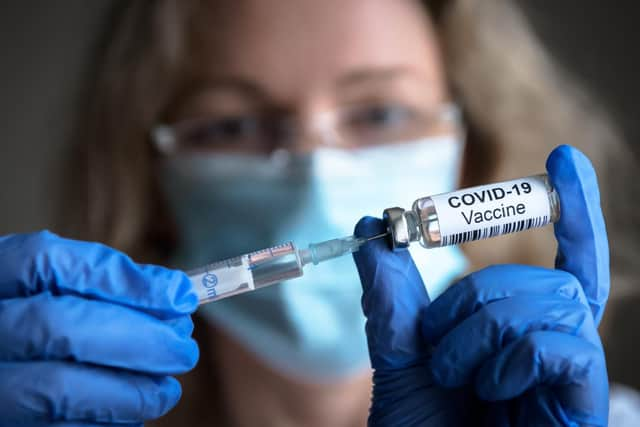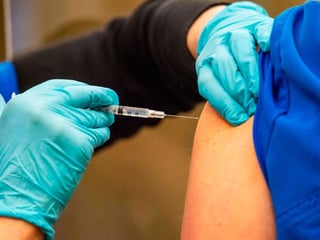Sputnik V: How effective is Russia's Covid jab compared to Oxford, Pfizer and Moderna vaccines - and has UK bought any?
This article contains affiliate links. We may earn a small commission on items purchased through this article, but that does not affect our editorial judgement.
and live on Freeview channel 276
The world's fight to end the coronavirus pandemic received another boost as Russia's Sputnik V vaccine produced "encouraging" efficacy results from interim trials.
Russia was criticised in some scientific circles last year when it approved the Sputnik V rollout for public use in August before late trials had been completed.
Advertisement
Hide AdAdvertisement
Hide AdThe Sputnik vaccine has since been administered to more than two million people worldwide and has been approved in more than 15 countries, ahead of interim results being published.


So how effective is the Sputnik V jab, how does it compare to other Covid vaccines and has the UK acquired any from Russia? Here's all you need to know...
How effective is Russia's Sputnik V vaccine?
Interim trial data, published in The Lancet on 2 February, has revealed Russia's Sputnik V vaccine is 91.6% effective against symptomatic Covid-19.
The preliminary findings are based on data gathered from 19,866 participants - 75% of whom received two doses of the vaccine and 25% were given a placebo.
Advertisement
Hide AdAdvertisement
Hide AdThe study found that there were no serious adverse events associated with vaccination during the trial and that those who did experienced mild, flu-like symptoms or low energy.
Data only includes symptomatic Covid cases so far. Further research is required to fully understand its efficacy on asymptomatic Covid and transmission.
“This recent positive phase three trial... is highly encouraging in terms of efficacy, a lack of serious side effects and seemingly equivalent protection in older patients,” said Dr Stephen Griffin, associate professor in the school of medicine at the University of Leeds.
How does the Sputnik V vaccine work?
Russia's Sputnik V vaccine is based on a modified version of adenovirus, which it says has been proven to be safe over decades of use.
Advertisement
Hide AdAdvertisement
Hide AdIt generates the production of coronavirus spike protein, which it passes to human cells, and in turn triggers an immune response in the body to protect against the virus.
Russia hopes the Sputnik V triggers a stronger and longer term immune response to the virus by using two different adenoviruses. The second jab is to be taken 21 days after the first.
How does it compare to other Covid vaccines?
Backed by the Russian Direct Investment Fund (RDIF), Sputnik V is one of three Covid vaccines worldwide with an efficacy higher than 90% in symptomatic cases.
The other two are Pfizer / BioNtech (95%) and Moderna (92%), while Oxford / AstraZeneca ranges between 62-90% effective - all three jabs have been approved by UK regulators.
Advertisement
Hide AdAdvertisement
Hide AdNovavax and Johnson and Johnson jabs have efficacy ratings of 86-89% and 66% respectively and are yet to be approved by the MHRA for use in the UK.
Sputnik V can be stored between two and eight degrees Celsius and costs around £7 per dose.
The Pfizer jab has to be stored at a temperature of -70c, the Moderna jab needs to be stored at -20c, while the Oxford, Novavax and Johnson and Johnson jabs can be stored at fridge temperature.
Sputnik's cost of around £7 a dose is on a par with the Johnson and Johnson vaccine, cheaper than Moderna (£28), Pfizer (£15), Novavax (£12) but more expensive than the Oxford jab (£3).
Has the UK acquired any of Russia's Sputnik V vaccine?
Advertisement
Hide AdAdvertisement
Hide AdThe UK has built up an order sheet of vaccines totalling more than 400 million jabs.
It is made up of the Oxford (100m), Pfizer (40m), Moderna (7m), Novavax (60), Johnson and Johnson (30m), GSK / Sanofi (60m) and the Valneva jabs.
The UK bought a further 40 million doses of the Valneva vaccine, produced in Scotland, taking its order of that jab to 100 million to increase its vaccine portfolio further.
The UK's vaccine taskforce doesn't list the Sputnik jab as one it has acquired as yet but the RDIF chief executive Kirill Dmitriev told BBC Radio 4 that discussions were likely.
Can the Sputnik jab be used with the Oxford vaccine?
Advertisement
Hide AdAdvertisement
Hide AdIt comes as a combined two-stage dosage of the Sputnik and Oxford is being explored to help fight against Covid mutations, the RDIF stated.
“We generally believe that two shots of different vaccines – AstraZeneca and Sputnik – may actually work better because immunity gets stronger," said Mr Dmitriev.
“This idea, called heterogeneous boosting, is at the core of the Sputnik vaccine because we use two different shots and we believe this is the best way to fight with mutations and this also fosters a partnership between different vaccine manufacturers.”
Clinical trials, he said, were about to get under way to test the Sputnik / Oxford jabs theory and when asked if the UK had contacted the RDIF about buying some of the vaccine, Mr Dmitriev replied: “Not yet, but I think once we have proven the efficacy of an AstraZeneca-Sputnik combination, I think it is possible to have this discussion with the UK.”
Research suggests Sputnik to be effective against the Kent variant of Covid-19, with further tests to take place on the South Africa and Brazil variants, added Mr Dmitriev.
